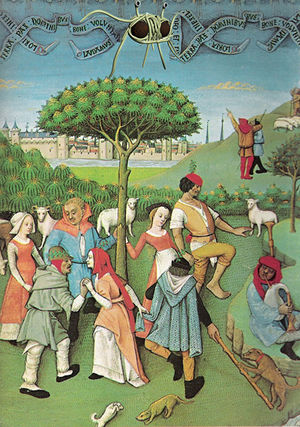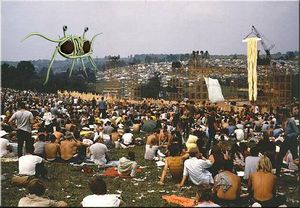User:Shrike/Holy Noodle Ceremony
The Holy Noodle Ceremony is an important facet of the Church of the Flying Spaghetti Monster. It is considered to be the most sacred ceremony of the church, as it celebrates the words of the FSM: "This is my pasta, this is my sauce."
History[edit | edit source]
First Ceremonies[edit | edit source]
Although shadowy images of the Noodle Ceremony can be found in the prehistoric cave paintings at Lascaux, the roots of the modern noodle ceremony can be found in 12th century Italy. It was at this time that Pirates from Malaysia stole silkworms from China and imported them into Italy. Intended for the production of Italian Tequila, they instead kicked off the European silk industry, as the material was in heavy demand for wartime parachutes. With an improvement in the standard of living, peasants became interested in self-improvement activities such as pasta making, and old religious ceremonies.
The first real Noodle Ceremony took place in 1358 in Bologna. After preparing the Most Holy Pasta, it was wrapped around a Pasta Pole located in the town square. The town's inhabitants then danced around the noodles as they lightly flapped in the wind. Although the exact steps of this dance are lost to the mists of time, it is said that the Safety Dance descended from the more ancient Noodle Dance. Once exhausted from dancing, the town's citizens would then devour the pasta.
In 1510 Chef Boyardee introduced his secret sauce (see the Heresy of Marinara) into the Holy Noodle Ceremony. Enthusiastically embraced by many, and vehemently abhorred by others, the introduction of sauce into the Ceremony turned the Church on its ear, launching a violent period of instability in the Church. This ultimately lead to a split in the church, starting with the Reformed Church of Alfredo, and ultimately leading to the War of the Noodles.
The 1970's disaster of terrorist tomatoes grounded the ceremony for 3 whole years, it returned after the 1981 Pasta Rights Act was enforce. People claimed that the 1970's disaster was more freightning than the 1810 Bread attack of which no records were kept.
French Connection[edit | edit source]
The Holy Noodle Ceremony continued to evolve over time, and the French introduced numerous innovations to the ceremony, which the FSM often attended:
- The French retained the Noodle Dance, but preferred to keep the noodles indoors instead of hanging the noodles from the Noodle Pole. The participants instead danced around a tree, typically to Disco or Industrial Dance music.
- Dressed in dark black outfits, they mimed scenes from the FSM canon.
- They introduced heavy cream into the sauces.
The French changes to the ceremony remain influential even today. In fact, so many elements of the ceremony have French origins that, during recent diplomatic complications between the United States and France, members of Congress began to refer to the Holy Noodles as Freedom Noodles.
Noodle Ceremony Today[edit | edit source]
Today's Holy Noodle Ceremony is a modern-day miracle. Unlike other gods, the FSM is not frightened to appear in public (so long as it's a paid gig), and often personally attends the larger ceremonies. Attendance for some of the outdoor events can soar into the hundreds of thousands, often requiring heavy lift equipment to prepare and distribute the Holy Noodles. As with the more ancient traditions associated with the Noodle Ceremony, the event is often followed by dancing and other stimulating activities.
In recent years there has been an outcry from some congregational members as commercialism has injected itself into the ceremony. Many of these events are sponsored by the likes of Ragu, Newman's Own, Thomas Brothers, and Viagra. There has been additional controversy concerning the eating of noodles in public schools, with some organizations contending that Federal school lunch program funds should not be applied to nonsecular noodles.


